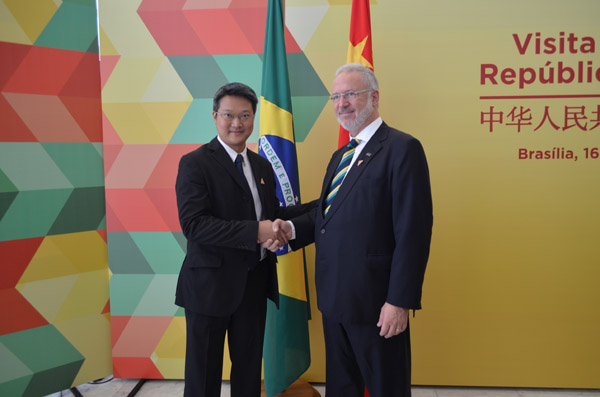Alibaba signs with Brazil mail
E-commerce giant developing an infrastructure foothold in LatAm
 |
|
Correios CEO Wagner Pinheiro de Oliveira (right) and Alibaba representative Michael Lee (left) shake hands following the MOU signature event in Brasilia on July 17. [Provided To China Daily] |
A proposed partnership between Alibaba Group Holding Ltd and Correios, Brazil's state-owned postal carrier, gives China's e-commerce leader an opportunity to build infrastructure in an emerging market while also exploring new opportunities for other partnerships in Latin America, according to analysts.
"If you look at any supersized e-commerce player today, all of them have global aspirations," Zia Daniell Widger, vice-president and research director with Forrester Research Inc, said in an interview on Friday with China Daily.
"There are no companies that are looking exclusively at their own domestic market as the sole source of revenue going forward."
"Correios, the Brazilian national postal service, is very involved in e-commerce so they're a natural partner on the fulfillment side," Widger said.
"But these markets are going to be very different from the Chinese e-commerce market, and the wisest companies are the ones that expand cautiously and don't jump in without understanding the market."
Alibaba, China's largest e-commerce firm, signed a Memorandum of Understanding (MOU) with the official Brazilian postal service on July 17, aiming to help facilitate two-way trade flows between Brazil and China.
The deal between Alibaba and Correios looks to forge and fortify relationships between Brazilian SMEs (small- and medium-sized enterprises) and potential Chinese customers.
Brazilian companies and consumers will also have access to the use of Alipay, Alibaba's online escrow service.
Doug Young, a financial journalism professor at Fudan University in Shanghai and former China company news chief at Reuters, said Alibaba's most recent move in Brazil has a clear focus on improving on-the-ground logistics, which is an area where "[Alibaba] trails its domestic competitors due to its business model".
Young wrote in an email to China Daily: "The company has much less control over the logistics responsible for order fulfillment and the general movement of merchandise ordered over its network because it only runs online malls that are populated by third-party merchants. By comparison, most of [Alibaba's] rivals operate their own online stores that make logistical issues much easier to control."
"Alibaba may be initially targeting merchants in Brazil who want to sell into China, but it could also use this new tie-up to eventually sell to consumers or business customers in Brazil itself," Young wrote.
Correios, founded in 1969 with its headquarters in Brasilia, carries three-quarters of the international orders in Brazil, according to a joint press release. It is also one of the leading employers in Brazil.
Young said some of Alibaba's overseas investments — including MOU deals with France and Italy and a $250 million investment in Singapore's postal service — would bring in more non-Chinese merchants for Alibaba and could help the company "differentiate itself from its rivals".
All these deals are in the works ahead of Alibaba's upcoming IPO, the value of which may hit at least $120 billion when it lists on the New York Stock Exchange (NYSE) later this year.
Widger said: "In some ways it's not surprising in that you've got the biggest e-commerce market in Asia interested in the biggest e-commerce market in Latin America. There's a lot of interest in buying from Chinese websites by consumers in Brazil and a growing amount of cross-border trade that Alibaba clearly wants to encourage."
jackfreifelder@chinadailyusa.com


















